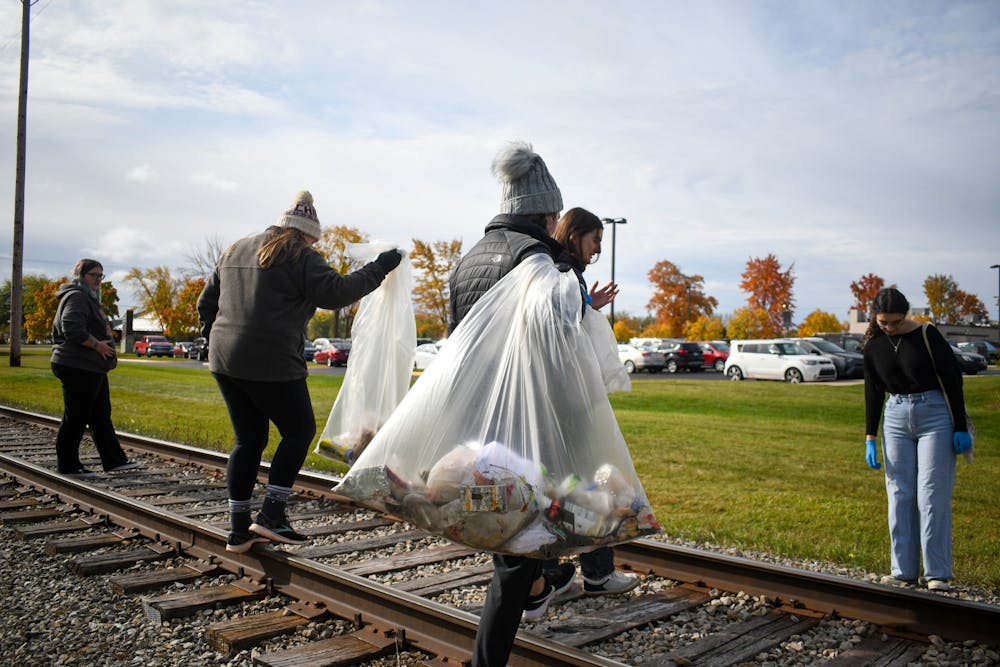Throwing sustainability out of the window
The impact of littering in a rural city

The importance of sustainable practices in coastal cities is widely known, as ocean and marine life health is a grave concern for environmentalists. But are these practices necessary in areas without oceans?
A 2021 study on the impact of littering pollution on wildlife revealed that discarded containers can be detrimental to the health and survival of many animal species, regardless of their location.
“Despite its global scope, the problem of the effect of garbage on terrestrial animals is often underestimated or ignored,” the study read. “However, our study shows that discarded containers are deadly traps for animals from small invertebrates to large carnivores and in various habitats including undisturbed wilderness.”
Julie Lyon, the founder of “Bonny’s Clean Up Crew” in Mount Pleasant, Michigan, has years of experience with littering in rural cities. Lyon has gathered a loyal team of volunteers over the years to commit their summers to picking up litter.
Founded in memory of her late mother, Lyon said that Bonny’s Clean Up Crew has grown exponentially over the years, now averaging 17 volunteers per cleanup. Students, churches, volunteer groups and concerned citizens meet every Sunday from April to October to clean up Mount Pleasant’s parks and other various polluted locations.
“We wanted to make sure (the parks) looked nice for people coming in,” Lyon said. “When they come from out of town, that’s how they’ll judge Mount Pleasant, so I want to make sure everything’s clean.”
Though Lyon does not believe all littering is malicious, she said that she has encountered her fair share of intentional trash dumping in the city.
“We don’t have a place to go dump trash,” Lyon said. “There’s some cities that have that. It would be nice if we did, because I see that people just go dump it off the side of the road and by the train tracks.”
On one of her many cleanups, Lyon said that her team pulled tires, an air conditioner, balloons and beer cans out of the Chippewa River. On another, 2,000 cigarette butts were recovered from a park. Lyon’s primary concern was for the wildlife of the area.
“I really don’t want any wildlife to suffer, so we try,” she said.
Lyon hopes that Bonny’s Clean Up Crew will be able to take on more projects in the future, eventually branching out to more polluted rural locations in need of attention.
“I want people to care,” Lyon said.
Dr. Mark Francek, a Central Michigan University Geography and Environmental Studies Professor and the advisor of the Geography and Environmental Club, said that the environment suffers from both biodegradable and non-biodegradable litter, regardless of its location.
He said that biodegradable litter, such as paper and kitchen waste, usually gets washed into storm drains, eventually leading to ponds, lakes and rivers. This litter could contain toxic bacteria such as (E-coli), that leads to over-fertilization of local water bodies, or eutrophication.
Non-biodegradable litter, such as plastic and glass, can be broken down into small segments that can be incorporated into the food chain.
“Plastics can just get ingested, clogged in the digestive system and produce a premature death,” Francek said. “And then it gets broken down into smaller and smaller segments so much so that they could be incorporated into the bloodstream. I mean, there’s (microplastics) in us right now.”
Francek also said that littered rural areas not only impact the environment, but the psychology of the area’s residents.
“The danger in rural areas, from a psychological viewpoint, it’s depressing when people see (litter),” He said. “Neighborhoods that are littered give more of an impulse that people say, ‘Oh, it’s okay if I litter too.’ Neighborhoods that are clean, just like when people keep up a green lawn, you want to keep your lawn green as well.”
The threat that litter pollution poses to rural cities may not appear as palpable as that of a coastal city, but its impact on the environment and residents of a rural area is profound.
Though issues as widespread as litter pollution are difficult to address, Francek believes that there are opportunities for rural cities such as Mount Pleasant to increase their sustainability moving forward.
Francek said that by performing a reconnaissance to identify the problem areas in the city, providing more accessible garbage disposals in those areas and providing more education for the residents, rural areas could increase the environmental and psychological health of their cities.
“There’s been progress made, but there’s more that can be done,” he said.






